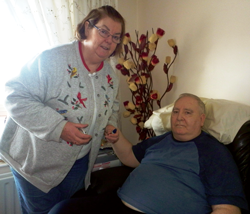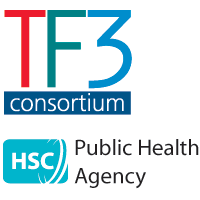TF3: 1,000 patients in Northern Ireland benefitting from improved care through Telemonitoring
 Modern technology and healthcare are working to help thousands of people in Northern Ireland with long term conditions take more control of managing their health through the ground-breaking Telemonitoring NI service.
Modern technology and healthcare are working to help thousands of people in Northern Ireland with long term conditions take more control of managing their health through the ground-breaking Telemonitoring NI service.
Remote telemonitoring combines technology and services that enable patients with chronic diseases to test their vital signs such as pulse, blood pressure, blood glucose and oxygen levels at home on a daily basis. This gives patients and their carers more information and more control over their health while supporting them to live independently in their own homes.
It also enables health service professionals to monitor patients allowing earlier intervention in, and the prevention of, the deterioration of condition, acute illness and hospital admissions.
The five health and social care trusts, led by the Centre for Connected Health and Social Care (part of the Public Health Agency), have contracted with TF3, a consortium of Tunstall Healthcare, Fold Telecare and S3 Group, to provide the Telemonitoring NI end-to-end managed service. This represents an investment of £18 million over six years by the Department of Health, Social Services and Public Safety.
With the fastest growing population in the UK, the prevalence of long-term conditions such as respiratory illnesses, heart disease, stroke and diabetes is expected to increase by 30 per cent.
Eddie Ritson, Programme Director of Centre for Connected Health and Social Care, said: “The roll-out of Telemonitoring NI represents a significant step towards providing quality care for the growing number of people with chronic illnesses who want to live at home while having their conditions safely managed.
“A patient will take vital sign measurements at home, usually on a daily basis, and these are automatically transmitted to the TF3 system, where they may be monitored by the triage team. If the patient’s readings cause concern, a nurse will contact them by phone to offer appropriate advice. If necessary, the patient’s clinician will be alerted to enable them to determine if any further action may be required.
“Telemonitoring is an excellent example of how modern technology can help deliver a better service for the patient and also allow more efficient use of the healthcare professional’s time and skills.”
Kevin McSorley, Service Delivery Director at TF3, added: “Telehealth is a tangible example of how trusts are seeking to deliver their ‘Transforming Your Care’ objectives. Patients and their carers are feeling the benefits of Telemonitoring NI. The service is already helping to transform the care of 1000 patients and has potential to considerably scale up from that level.”
Studies from elsewhere have shown that telemonitoring interventions can reduce mortality rates by 45 per cent and reduce emergency admissions by 20 per cent.
A recent survey of over 100 patients who have used the service demonstrates that 92 per cent of patients were very satisfied by the triage nurses when contacted by them and 96 per cent thought the officer who installed the equipment and trained the patient was very helpful.
Marie Farren, the wife and carer of diabetes sufferer Michael (pictured), said: “Everything just fell into place once telemonitoring was fitted; Michael hasn’t had a hospital admission or infection since. We really appreciate the support, especially as I am the primary carer for Michael. Sometimes you feel as though you’re the only one doing it, but with the support of the service I have been able to care for Michael better and he is much happier, which feels great.”
Telemonitoring NI is here today, it’s delivering and it’s transforming care with an established service delivery model and the capacity to grow exponentially.
For more information please visit www.telemonitoringni.info






